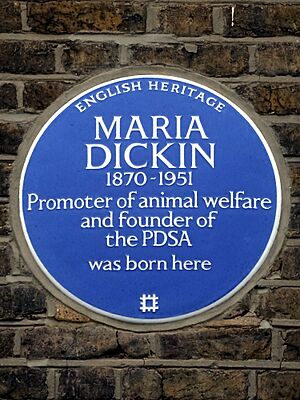Maria Dickin facts for kids
Quick facts for kids
Maria Dickin
|
|
|---|---|
| Born |
Maria Elisabeth Dickin
September 22, 1870 South Hackney, Middlesex
|
| Died | March 1, 1951 (aged 80) London
|
| Nationality | British |
| Other names | Mia |
| Occupation | Social reformer, animal welfare pioneer |
Maria Elisabeth Dickin (nicknamed Mia) was a British social reformer and a true pioneer in animal welfare. Born on September 22, 1870, she dedicated her life to helping animals. In 1917, she founded the People's Dispensary for Sick Animals (PDSA), a charity that provides free veterinary care. The famous Dickin Medal, which honors brave animals, is named after her. She passed away on March 1, 1951, at the age of 80.
Contents
Who Was Maria Dickin?
Maria Dickin was a remarkable woman who believed that all animals deserved care, no matter how much money their owners had. She created a way for pets to get the help they needed, even if their families couldn't afford it. Her work changed how people thought about animal welfare and led to a lasting legacy.
Her Early Life
Maria Dickin was born in 1870 in South Hackney, Middlesex, England. She was the oldest of eight children. Her father, William George Dickin, was a minister. From a young age, Maria showed a strong sense of compassion and a desire to help others.
Helping Animals: The PDSA
Maria Dickin's most famous achievement was founding the People's Dispensary for Sick Animals (PDSA) in 1917. She started this amazing charity in a small cellar in Whitechapel, London. Her goal was simple: to give kind and proper veterinary care to pets whose owners couldn't pay for it.
The sign on her door clearly stated her mission: "Bring your sick animals/Do not let them suffer/All animals treated/All treatment free." This meant that any animal in need could get help, and it wouldn't cost their owners anything. This was a revolutionary idea at the time.
A Mobile Vet Clinic
Maria didn't stop at just one location. In 1921, she added a special horse-drawn mobile unit. This was like a traveling vet clinic on wheels! It allowed her to treat more animals in different neighborhoods. It also helped her teach people about animal health. This mobile unit was the very first of many traveling clinics that the PDSA would use.
The Busy Bees Club
Maria Dickin also understood the importance of teaching young people about kindness to animals. In 1929, she started a children's club called "Busy Bees." This club focused on teaching kids about animal welfare and how to care for their pets properly. It helped inspire a new generation of animal lovers.
Honoring Animal Heroes
During World War II, Maria Dickin created a special medal to honor animals that showed incredible bravery during the war. This medal was later renamed the Dickin Medal. It is now known as the "animal equivalent of the Victoria Cross," which is a very high award for human bravery. The Dickin Medal recognizes animals for their outstanding service and courage.
Maria Dickin received honors for her own work too. She was awarded an OBE in 1929 and later a higher honor, a CBE, in 1948.

Her Lasting Impact
Maria Dickin married her first cousin, Arnold Francis Dickin, in 1899. They did not have any children. Maria Dickin passed away in London in 1951, at the age of 80.
Her legacy lives on through the PDSA, which continues to help countless animals every day. The Dickin Medal also ensures that the bravery of animals is never forgotten. A special blue plaque was placed at her birthplace in Hackney in 2015, remembering her incredible contributions to animal welfare.
 | Kyle Baker |
 | Joseph Yoakum |
 | Laura Wheeler Waring |
 | Henry Ossawa Tanner |

